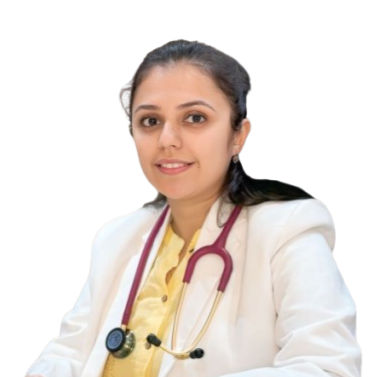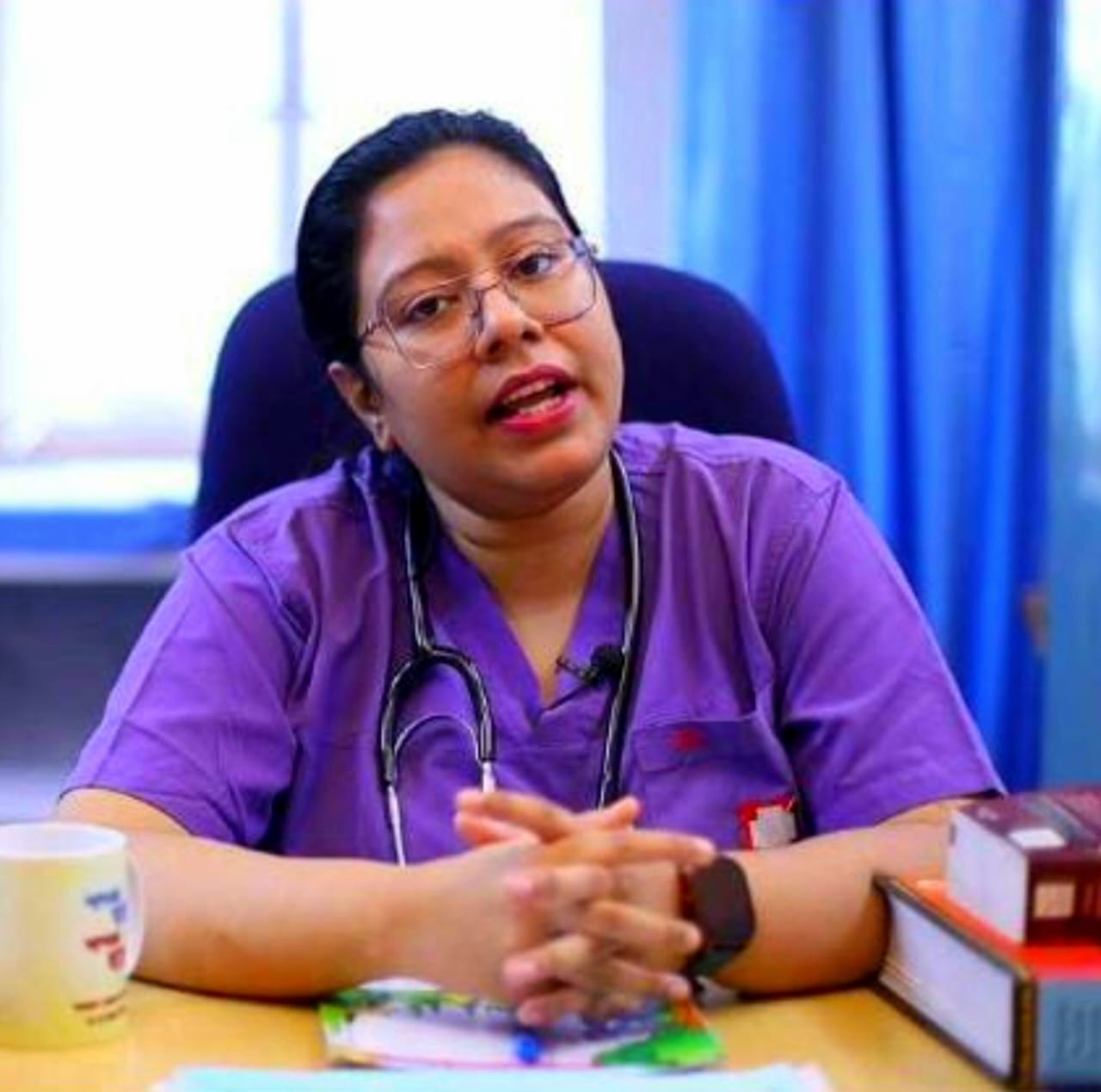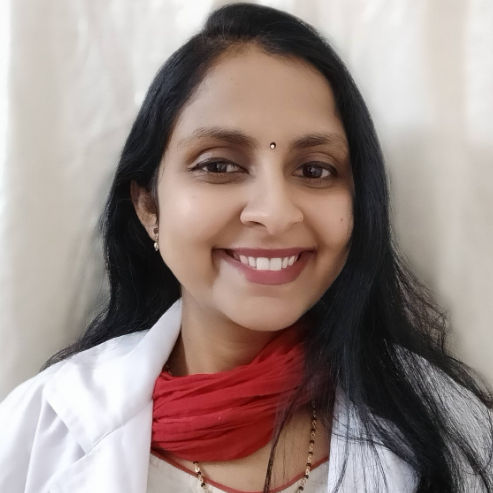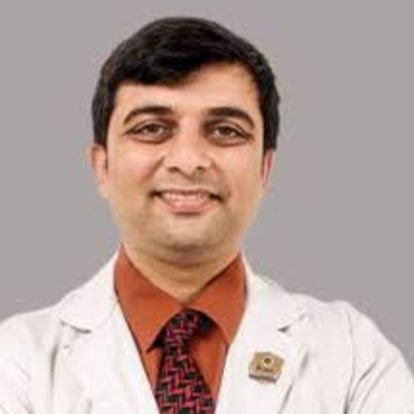Consult Pediatricians Online - Child Specialists (441 doctors)

Dr. Revathy S
Paediatrician
3 Years • MBBS, MD (Paediatrics)
Apollo 24|7 Virtual Clinic - Kerala Angamaly

Dr. Kesha Nayak
Paediatrician
6 Years • MBBS, MD (Paediatrics)
Nashik
Apollo 24|7 Virtual Clinic - Maharashtra, Nashik
Dr. K Srinivas
Paediatrician
3 Years • MBBS, MD Paediatrics
Yemmiganur
SRINIVASAA HOSPITAL, Yemmiganur

Dr. Saheli Dasgupta
Paediatrician
10 Years • MBBS, MD (Paediatrics), Indian Diploma of Paediatric Critical Care Medicine
Kolkata
Sristi Polyclinic, Kolkata

Dr. K. P. K. N Venkata Ramana
Paediatrician
12 Years • MBBS, MD (Paediatrics)
Vijayawada
Sri Venkateswara Children & Multi Speciality hospital, Vijayawada

Dr. Akhila Hb
Paediatrician
7 Years • MBBS, MD ( PAEDIATRICS), Fellowship in Asthma and Allergy
Bengaluru
Apollo Medical Center, Marathahalli, Bengaluru

Dr Sharvari Kulkarni
Paediatrician
5 Years • MBBS, MD PEDIATRICS
Pune
Apollo Clinic, Viman Nagar, Pune
Dr. Deepika S
Paediatrician
5 Years • MD, Peadiatrics
Chennai
Apollo Clinic, T Nagar, Chennai

Dr.rajarajan J
Paediatrician
26 Years • MBBS,MD,MRCPCH
Chennai
Apollo Clinic, Valasaravakkma, Chennai

Dr. Kalale Nikhil Nagaraj
Paediatrician
10 Years • MBBS DNB PEDIATRICS
Bengaluru
Apollo Clinic, JP nagar, Bengaluru
Book Consult for Paediatrics Online
Booking a paediatrician consultation with Apollo 24|7 is a simple and straightforward process. Our platform offers easy access to top child specialists and paediatricians for all your child's healthcare needs. With a few clicks, you can book paediatrician online and choose from convenient appointment slots at trusted hospitals and clinics near you. Our experienced specialist for pneumonia can provide comprehensive care for a wide range of childhood illnesses, from common colds to complex conditions like pneumonia. Trust Apollo 24|7 for reliable paediatrician reviews and transparent paediatrician fees, and you can find nearby doctors by searching paediatrician near me. Book your appointment today and ensure your child receives the highest quality medical care.
What is Paediatrics?
Paediatrics is a branch of medicine that focuses on the healthcare of infants, children, adolescents, and young adults. This field focuses on the health, growth, and development of young patients, addressing their unique physical, mental, and social needs. Paediatricians treat a wide range of conditions, from minor illnesses like colds and ear infections to more severe issues such as congenital disorders, chronic diseases, and developmental disabilities. The importance of paediatrics in healthcare cannot be overstated, as it plays a crucial role in ensuring the physical, emotional, and developmental well-being of children through preventive health measures, health education, and advocating for children's health policies.
Who is a Paediatrician?
A paediatrician is a medical doctor who specialises in providing healthcare for infants, children, and adolescents. In the Indian subcontinent, aspiring paediatricians must complete a five-and-a-half-year undergraduate medical program (MBBS) followed by a three-year postgraduate specialisation (MD or DNB) in paediatrics. Paediatricians are trained to diagnose, treat, and manage a wide range of childhood illnesses, from common conditions like asthma and allergies to more complex issues such as genetic disorders and childhood cancers. Child doctors also play a vital role in preventive healthcare, providing immunisations, developmental screenings, and guidance on nutrition and healthy lifestyle habits to help children maintain optimal health and well-being.
What Do Paediatricians Do?
As child specialists, paediatricians are dedicated to providing comprehensive healthcare for infants, children, and adolescents. These skilled child doctors are trained to diagnose and treat a wide range of childhood illnesses, including common conditions like ear infections and pneumonia, as well as more complex issues such as congenital disorders and developmental disabilities. When you book a paediatrician online or schedule an in-person paediatrician consultation, you can expect the following:
Thorough physical examinations to assess your child's growth, development, and overall health
Diagnosis and treatment of acute and chronic illnesses
Administration of vaccinations to protect against preventable diseases
Guidance on nutrition, exercise, and other aspects of healthy living
Referrals to specialists when necessary, such as paediatric cardiologists or neurologists
Emotional support and counselling for children and their families
What are the other Sub-Specialities of Paediatrics?
Paediatrics encompasses a wide range of sub-specialities that focus on specific aspects of child health and development. Some of the most common sub-specialities include:
Neonatology: This sub-speciality focuses on the care of newborns, particularly those who are premature, have low birth weight, or have congenital disorders.
Paediatric Cardiology: Paediatric cardiologists specialise in diagnosing and treating heart conditions in children, such as congenital heart defects and arrhythmias.
Paediatric Neurology: This sub-speciality deals with the diagnosis and treatment of neurological disorders in children, including epilepsy, cerebral palsy, and neuromuscular diseases.
Paediatric Oncology: Paediatric oncologists specialise in the treatment of children with cancer, providing chemotherapy, radiation therapy, and other interventions.
Paediatric Gastroenterology: This sub-speciality focuses on the diagnosis and treatment of digestive system disorders in children, such as inflammatory bowel disease and coeliac disease.
Paediatric Endocrinology: Paediatric endocrinologists treat hormonal disorders in children, including diabetes, growth disorders, and thyroid problems.
Paediatric Nephrology: This sub-speciality deals with the diagnosis and treatment of kidney diseases in children, such as nephrotic syndrome and urinary tract infections.
Paediatric Pulmonology: Paediatric pulmonologists specialise in the treatment of respiratory disorders in children, including asthma, cystic fibrosis, and bronchopulmonary dysplasia.
Paediatric Infectious Diseases: This sub-speciality focuses on the diagnosis and treatment of infectious diseases in children, such as meningitis, pneumonia, and HIV/AIDS.
Paediatric Rheumatology: Paediatric rheumatologists treat autoimmune and inflammatory disorders in children, such as juvenile idiopathic arthritis and lupus.
Paediatric Haematology: This sub-speciality deals with the diagnosis and treatment of blood disorders in children, including anaemia, hemophilia, and sickle cell disease.
Paediatric Surgery: Paediatric surgeons specialise in performing surgical procedures on children, from neonatal surgery to the correction of congenital anomalies.
Paediatric Critical Care Medicine: This sub-speciality focuses on the care of critically ill children, often in paediatric intensive care units (PICUs).
Paediatric Allergy and Immunology: Paediatric allergists and immunologists treat children with allergies, asthma, and immune system disorders.
Paediatric Dermatology: This sub-speciality focuses on diagnosing and treating skin conditions in children, from newborns to adolescents.
Adolescent Medicine: Adolescent medicine specialists provide comprehensive care for teenagers and young adults, addressing their unique physical, mental, and social needs.
Paediatric Genetics: This sub-speciality focuses on the diagnosis and management of genetic disorders in children, providing genetic counselling and testing services.
What are the Examinations Conducted Under Paediatrics or Tests Performed by a Paediatrician?
Paediatricians perform a variety of diagnostic tests and examinations to monitor and manage the health of children. Some of the most common examinations and tests include:
Physical Examinations: Paediatricians conduct regular check-ups to monitor a child's growth, development, and overall health. These examinations include measurements of height, weight, and head circumference, as well as assessments of vital signs, reflexes, and physical abnormalities.
Developmental Screenings: These assessments evaluate a child's cognitive, language, motor, and social skills to identify any potential delays or disabilities. The child specialist may use standardised tools like the Denver Developmental Screening Test (DDST) or the Ages and Stages Questionnaire (ASQ) to conduct these screenings.
Vision and Hearing Tests: Child doctors regularly check children's vision and hearing to detect any impairments that may affect their learning and development. These tests are typically performed at well-child visits and may be repeated as needed.
Immunisation Schedules: Paediatricians administer vaccines according to the recommended immunisation schedule to protect children against preventable diseases such as measles, mumps, rubella, and polio.
Laboratory Tests: Paediatricians may order various laboratory tests to diagnose or monitor certain conditions. These tests can include complete blood counts (CBCs), urinalysis, and tests for lead exposure, anaemia, and thyroid function.
Imaging Studies: In some cases, child doctors may request imaging studies such as X-rays, ultrasounds, or CT scans to diagnose conditions like fractures, appendicitis, or congenital abnormalities.
Allergy Tests: For children with suspected allergies, a child specialist may perform skin prick tests or blood tests to identify specific allergens and develop an appropriate treatment plan.
What are the Common Conditions & Diseases that Paediatricians treat?
The common conditions and diseases treated by paediatricians include:
Respiratory Infections: Common cold, influenza, pneumonia, and bronchiolitis are frequently treated by a specialist for pneumonia.
Ear Infections: Otitis media, or middle ear infection, is a common reason for visits to a child specialist.
Gastrointestinal Issues: Gastroenteritis, constipation, and reflux are often managed by paediatricians.
Skin Conditions: Eczema, diaper rash, and other skin rashes are commonly seen by child doctors.
Allergies: Food allergies, hay fever, and asthma are frequently diagnosed and treated by paediatricians.
Developmental Delays: Autism spectrum disorder, attention deficit hyperactivity disorder (ADHD), and learning disabilities are managed by paediatricians.
Genetic Disorders: Down syndrome, cystic fibrosis, and sickle cell disease are examples of genetic conditions that paediatricians help manage.
Infectious Diseases: Measles, chickenpox, and whooping cough are some of the infectious diseases that paediatricians treat and prevent through vaccinations.
Neurological Conditions: Epilepsy, cerebral palsy, and headaches are neurological issues that paediatricians address.
Urinary Tract Infections: UTIs are common in children and are diagnosed and treated by child doctors.
Injuries: Minor injuries, such as sprains, fractures, and concussions, are often initially assessed by paediatricians.
Obesity: Childhood obesity is a growing concern that child specialist help manage through lifestyle modifications and medical interventions when necessary.
Mental Health Issues: Depression, anxiety, and eating disorders are mental health concerns that paediatricians screen for and help manage.
Sleep Disorders: Insomnia, sleep apnea, and other sleep disturbances in children are addressed by child doctors.
Dental Issues: Paediatricians often provide initial assessments and referrals for dental problems, such as tooth decay and gum disease.
Reasons to See a Paediatrician
Consulting a child specialist is essential for ensuring the health and well-being of your child. Here are some key reasons to book a paediatrician online or visit one in person:
Routine Check-ups: Regular visits to a paediatrician are crucial for monitoring your child's growth, development, and overall health. These check-ups allow for early detection and intervention of any potential issues.
Vaccinations: Paediatricians ensure that your child receives all necessary vaccinations on schedule to protect against serious diseases like measles, mumps, and rubella.
Illness or Injury: If your child is experiencing symptoms like fever, cough, vomiting, or has sustained an injury, a paediatrician consultation can provide prompt diagnosis and treatment.
Developmental Concerns: If you have concerns about your child's physical, cognitive, or emotional development, a child specialist can assess these issues and provide guidance on appropriate interventions.
Chronic Conditions: Children with chronic conditions like asthma, diabetes, or epilepsy require regular monitoring and management by a paediatrician to ensure optimal health outcomes.
Nutritional Guidance: Child doctors offer advice on proper nutrition, including breastfeeding support, introduction of solid foods, and management of food allergies or intolerances.
What Types of Procedures do Paediatricians Perform?
Paediatricians can perform different types of procedures, including:
Vaccinations: Paediatricians administer routine vaccinations to protect children against diseases like measles, mumps, rubella, and polio.
Developmental Screenings: Child doctors conduct regular screenings to assess a child's physical, cognitive, and emotional development, identifying any potential delays or concerns.
Physical Examinations: Routine physical exams are performed to monitor growth, check vital signs, and assess overall health.
Hearing and Vision Tests: Paediatricians conduct hearing and vision screenings to identify any potential issues that may impact a child's development and learning.
Allergy Testing: Skin prick tests or blood tests may be performed to identify allergies to foods, medications, or environmental factors.
Asthma Management: Child specialists develop asthma action plans, prescribe medications, and provide education on managing asthma symptoms.
Wound Care: Minor wounds, cuts, and scrapes are cleaned, treated, and dressed by paediatricians.
Fracture Management: Paediatricians assess and treat minor fractures, applying casts or splints as needed.
Foreign Body Removal: Objects stuck in the nose, ears, or throat are carefully removed by paediatricians.
Intravenous (IV) Fluids: In cases of dehydration or illness, paediatricians may administer IV fluids to restore hydration and provide necessary nutrients.
Nebuliser Treatments: Breathing treatments with nebulised medications are given to children with respiratory conditions like asthma.
Lumbar Puncture: In cases of suspected meningitis or other central nervous system infections, child specialists may perform a lumbar puncture to collect cerebrospinal fluid for analysis.
Wart Removal: Child doctors can remove warts using cryotherapy (freezing) or other methods.
Circumcision: Paediatricians may perform newborn circumcision, a surgical procedure to remove the foreskin of the penis.
Ear Wax Removal: Impacted ear wax can be safely removed by paediatricians using specialised instruments.
Why Choose an Apollo 24|7 Paediatrician?
Apollo 24|7 paediatricians are highly qualified, experienced, and dedicated to providing exceptional care for your child. Our team of child specialists consists of board-certified professionals who stay up-to-date with the latest advancements in paediatric medicine. When you choose an Apollo 24|7 paediatrician, you can expect personalised attention, thorough assessments, and tailored treatment plans that address your child's unique needs. Our child doctors have access to state-of-the-art diagnostic tools and cutting-edge treatment options, ensuring that your child receives the best possible care. With the convenience of online paediatrician consultations and in-clinic appointments, Apollo 24|7 makes it easy for you to access top-notch paediatric care whenever and wherever you need it.
What to Expect When Visiting a Paediatrician?
During a visit to a paediatrician, you can expect a comprehensive evaluation of your child's health and development. This may include:
Physical Examination: The paediatrician will perform a head-to-toe assessment, checking your child's growth, vital signs, and overall physical health.
Developmental Screening: Your child's cognitive, social, and emotional development will be assessed using age-appropriate milestones and standardised tools.
Immunisation Review: The child doctor will review your child's vaccination records and administer any necessary vaccines.
Health History: You will be asked about your child's medical history, including any previous illnesses, surgeries, or hospitalisations.
Discussion of Concerns: The child specialist will address any concerns you may have about your child's health, behaviour, or development, offering guidance and recommendations.
Diagnostic Tests: If needed, the paediatrician may order tests such as blood work, urine analysis, or imaging studies to diagnose or rule out certain conditions.
Treatment Planning: Based on the evaluation, the paediatrician will develop a personalised treatment plan, which may include medications, therapies, or referrals to specialists.
How Can I Get an Appointment With a Paediatrician?
Booking an appointment with a paediatrician at Apollo 24|7 is simple and convenient. You have several options:
Online Booking: Visit the Apollo 24|7 website and navigate to the "Paediatrics" section. Select your preferred doctor based on their profile, paediatrician reviews, and availability. Choose a suitable date and time slot, and book a paediatrician online by providing the necessary information. You can search for paediatrician near me to find doctors in your area.
Mobile App: Download the Apollo 24|7 mobile app from the App Store or Google Play Store. Log in or create an account, then follow the steps mentioned above to book a paediatrician consultation.
Offline Booking: Call the Apollo 24|7 helpline and speak with a representative to schedule an appointment with a specialist for pneumonia near you. Alternatively, you can visit your nearest Apollo Clinic or hospital and request an appointment at the reception desk and ask about the paediatrician fee.
Doctor Referrals: If your child is referred to a specific paediatrician by another doctor, contact Apollo 24|7 to arrange an appointment with the recommended specialist.
Paediatricians in Other Top Cities
- •Best Paediatricians in Bengaluru
- •Best Paediatricians in Chennai
- •Best Paediatricians in Hyderabad
- •Best Paediatricians in Kolkata
- •Best Paediatricians in Mumbai
- •Best Paediatricians in Noida
- •Best Paediatricians in New Delhi
- •Best Paediatricians in Delhi
- •Best Paediatricians in Pune
- •Best Paediatricians in Visakhapatnam
- •Best Paediatricians in Ahmedabad
- •Best Paediatricians in Greater Noida
- •Best Paediatricians in Bangalore
- •Best Paediatricians in Ghaziabad
- •Best Paediatricians in Vadodara
- •Best Paediatricians in Guwahati
- •Best Paediatricians in Lucknow
- •Best Paediatricians in Vijayawada
- •Best Paediatricians in Gurugram
- •Best Paediatricians in Warangal
Doctors in Top cities
- •Top Doctors in Hyderabad
- •Top Doctors in Bengaluru
- •Top Doctors in Chennai
- •Top Doctors in Kolkata
- •Top Doctors in East Godavari
- •Top Doctors in Mumbai
- •Top Doctors in New Delhi
- •Top Doctors in Bangalore
- •Top Doctors in Delhi
- •Top Doctors in Pune
- •Top Doctors in Gurugram
- •Top Doctors in Noida
- •Top Doctors in Ahmedabad
- •Top Doctors in Lucknow
- •Top Doctors in Ghaziabad
- •Top Doctors in Visakhapatnam
- •Top Doctors in Guwahati
- •Top Doctors in Madurai
- •Top Doctors in Bhubaneswar
- •Top Doctors in Vijayawada
Related Services
- •Doctors for Bowel wash
- •Doctors for Care of ostomy and colostomy
- •Doctors for Consultation
- •Doctors for 9968906868
- •Doctors for Acromioplasty or Sub-acromial Decompression
- •Doctors for Adhesiolysis for FROZEN SHOULDER
- •Doctors for Ankle surgery
- •Doctors for Arthroscopic Assisted Glenoid / Scapular fracture reduction
- •Doctors for Bankart/SLAP/GLAD/ Perthes lesion/ ALPSA repair- instability surgery
- •Doctors for Biceps tenotomy / Tenodesis
- •Doctors for Bunion surgery
- •Doctors for C-section
- •Doctors for Capping
- •Doctors for CBP,ESR, CRP,stool exam
- •Doctors for Central line removal
- •Doctors for Change of dressing
- •Doctors for Consuktation
- •Doctors for CT Scan Abdomen
- •Doctors for CT Scan Abdomen Tripasic
- •Doctors for CT Scan Brain
Related Treatments
- •Treatment for Adhd
- •Treatment for Acute Diarrhea Treatment
- •Treatment for Adolescent Medicine
- •Treatment for Adopted Child Syndrome
- •Treatment for Adopted Child Syndrome Treatment
- •Treatment for Coronavirus Symptom
- •Treatment for Covid
- •Treatment for Abandoned Child Syndrome
- •Treatment for Abdominal aortic aneurysm
- •Treatment for Abdominal Pain
- •Treatment for Abnormal Behavior
- •Treatment for Acid Peptic Disorders
- •Treatment for Acne Scars
- •Treatment for Actinomycosis
- •Treatment for Acute Diarrhea
- •Treatment for Acute Myocardial Infarction
- •Treatment for Acute Pancreatitis
- •Treatment for Adjustment Disorder
- •Treatment for Adolescence To Menopause Care
- •Treatment for Affective And Emotional Difficulties
FAQs
What is a paediatrician?
A paediatrician is a child specialist who has undergone extensive medical training to provide comprehensive healthcare for infants, children, and adolescents. They are experts in diagnosing and treating a wide range of childhood illnesses, from common colds to complex medical conditions, and also provide guidance on preventive care, nutrition, and developmental milestones.
When should I take my child to a paediatrician?
It is recommended to schedule a regular paediatrician consultation from birth to adolescence. These visits typically occur at 1, 2, 4, 6, 9, 12, 15, 18, and 24 months, followed by annual check-ups from ages 3 to 18.
How can I find a reliable paediatrician near me?
To find a trusted child specialist, ask for recommendations from friends, family, or your family physician. You can also search online using the phrase paediatrician near me. Before finalising your choice, consider factors like the paediatrician's qualifications, experience, hospital affiliations, and paediatrician reviews.
Can I book paediatrician online consultations?
Yes, many child doctors now offer online consultations, allowing you to book paediatrician online appointments for your child's healthcare needs. This convenient option is particularly useful for minor concerns or follow-up visits.
What is the typical paediatrician consultation fee?
The paediatrician consultation fee varies depending on factors such as location, experience, and specialisation. In India, fees can range from Rs. 500 to Rs. 2,000 or more per visit. Some paediatricians may charge higher fees for initial consultations or specialised services.
How do I choose a paediatrician based on reviews?
Reading paediatrician reviews can provide valuable insights into a doctor's expertise, bedside manner, and overall patient satisfaction. Look for reviews on trusted platforms, such as official healthcare websites or reputable online forums. Pay attention to consistent feedback patterns and prioritise recent reviews.
What should I expect during a paediatrician consultation?
During a paediatrician consultation, the doctor will review your child's medical history, discuss any concerns you may have, and perform a physical examination. They will assess your child's growth, development, and overall health and may order diagnostic tests if necessary. The paediatrician will also provide guidance on preventive care, vaccination schedules, nutrition, and age-appropriate milestones.
Can a paediatrician treat my child for respiratory issues like pneumonia?
Yes, paediatricians are trained to diagnose and treat a wide range of childhood illnesses, including respiratory conditions such as pneumonia. As a specialist for pneumonia and other respiratory issues, a child doctor will evaluate your child's symptoms, perform necessary tests, and prescribe appropriate treatment.
What are the educational requirements for becoming a child specialist in India?
To become a child specialist or paediatrician in India, one must first complete an MBBS degree from a recognised medical college. After completing the MBBS, aspiring paediatricians must pursue a three-year postgraduate degree in paediatrics (MD paediatrics or DNB paediatrics).
How can I prepare for my child's first paediatrician consultation?
To prepare for your child's first paediatrician consultation, gather relevant medical records, including immunisation history and any previous health concerns. Make a list of questions or concerns you want to discuss with the paediatrician.